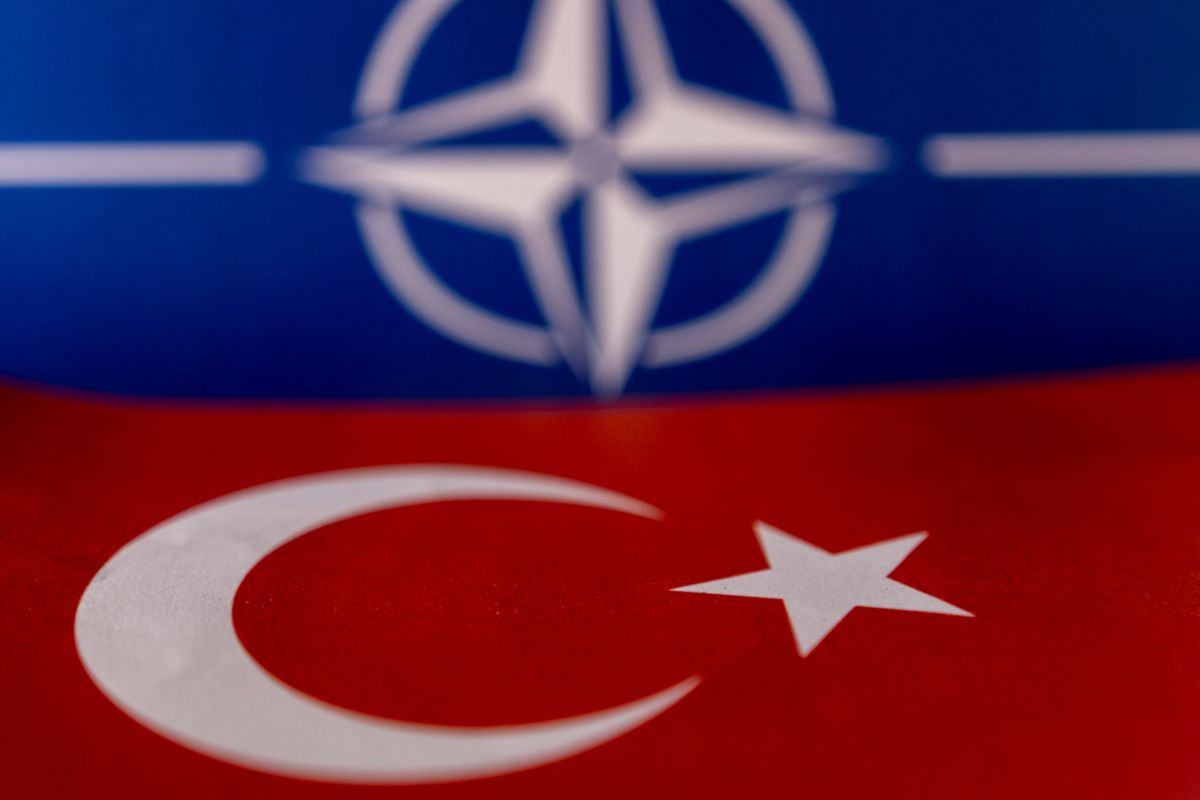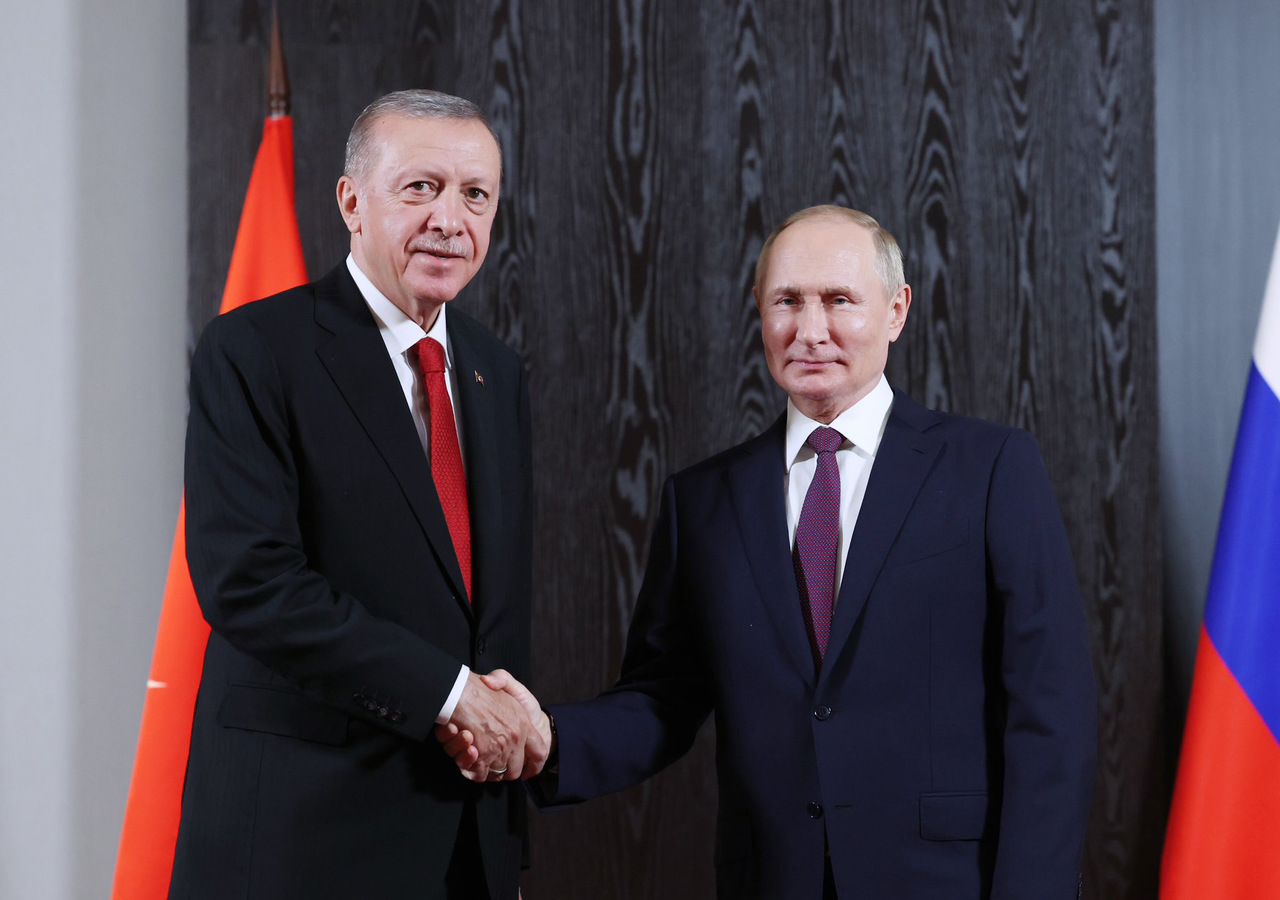Turkish Diplomacy Utilises Transactionalism in EU, U.S. Relations
On 10 July, Turkish President Recep Tayyip Erdoğan agreed to submit a protocol to the Turkish parliament approving Sweden’s membership of NATO and pledged to revive discussions on Türkiye’s accession to the European Union. The return to a pro-Western narrative and attempts at a new opening in relations with the EU and the U.S. are mainly motivated by the economic factor. At the same time, the Turkish authorities continue their transactional approach to foreign policy, which translates into a desire to maintain good relations with Russia.
.jpg) Ak Party Office / Zuma Press / Forum
Ak Party Office / Zuma Press / Forum
Between NATO and Russia
Erdoğan agreeing to Sweden’s admission to NATO is part of his transactional approach to foreign policy. This is evidenced by his pressure on U.S. President Joe Biden ahead of the NATO summit in Vilnius for the allies to endorse Türkiye’s EU membership before the Turkish authorities agreed to Sweden’s accession to NATO. This was met with a positive response from Biden, and Erdoğan assured then that he would support ratification of the Swedish application in the October vote. The most active opposition to Sweden’s accession to NATO has been expressed by the Nationalist Action Party (MHP; a smaller coalition partner of the ruling Justice and Development Party, AKP), which won 10% of the vote in this year’s elections. In return for Turkish approval, Sweden has introduced anti-terrorism legislation and pledged to cooperate with Türkiye on counter-terrorism once it joins the North Atlantic Alliance. It also agreed to support efforts to reinvigorate Türkiye’s EU accession process, including the modernisation of the customs union and visa liberalisation.
Türkiye’s approval of Sweden’s accession to the North Atlantic Alliance did not cause outrage in Russia, which is aware of Türkiye’s Alliance commitments. However, Erdoğan’s endorsement of Ukraine’s NATO membership and subsequent handover of commanders of the Azovstal defence to the Ukrainian government despite an agreement with the Russian side to keep them interned in Türkiye until the end of the war, raised protests from the Kremlin. Erdoğan and Putin have been conducting diplomacy based on good personal relations for years and are able to make tactical alliances despite their opposing positions. The willingness to do so was confirmed by the Russian president’s spokesperson, who emphasised that Russia is aware of the levels of compromise and divergence in relations with Türkiye. In the near term, however, the challenge for Turkish diplomacy will be to persuade Russia to return to the grain agreement, which was in force until 17 July this year. From Türkiye’s perspective, the deal is a question of preserving stability in the Black Sea basin and its international prestige.
Relations with the EU and the U.S
A transactional approach also characterises the current attempt to rebuild Türkiye’s relationship with the EU. This is because Türkiye’s accession is not supported by the majority of EU countries. Their governments maintain correct relations with Türkiye because of its strategic importance to Europe, but these are not underpinned by the community of values that comprise the basis of the Union. This is the consequence of the erosion of democratic standards under Erdoğan and AKP governments. Therefore, Türkiye looks to the EU for the benefits of pragmatic cooperation in the fight against terrorism, in the energy sector, and in sustaining supply chains, among others. Another manifestation of transactionalism in this relationship was the 2016 migration agreement, in which Türkiye detains migrants heading to the EU on its territory in exchange for financial assistance and a boost to the accession process. Each side’s different interpretation of the agreement has been a source of tension, as evidenced, for example, by the passage of migrants across Türkiye’s border with Greece in February 2020.
Türkiye is also keen to improve relations with the U.S. It has, for example, used its positive relations with both sides of the war in Ukraine to act as an intermediary between them and bring about an agreement on the Black Sea grain corridor. Türkiye’s key role in forging an agreement serves to convince its Western allies of the benefits of its maintaining good relations with Russia and limiting its attempts to force it to take an unequivocal stance against Russian aggression. Türkiye further believes that a mediating role and agreeing to Sweden’s admission to NATO will induce the U.S. to agree to sell it arms. After being removed from the development and production programme for the fifth-generation F-35 fighter jet in 2019 due to the purchase of Russia’s S-400 anti-aircraft system, Turkish policymakers are seeking to acquire 40 F-16 multi-role aircraft and 80 upgrade kits for the aircraft they already have from the U.S. While the Biden administration supports these efforts, approval is needed from the U.S Congress, where there is no consensus on the issue. Among those opposing it is fellow Democrat Bob Menendez, the chairman of the Senate foreign affairs committee, who points to Türkiye’s confrontational policy and the risk of it using F-16s in territorial disputes with Greece.
Internal Context
By means of a pro-Western narrative, Erdoğan wants to increase his credibility in the eyes of allies, thereby restoring the confidence of Western investors. This is motivated by Türkiye’s deepening economic problems. Despite a post-election return to a conventional monetary policy of raising interest rates from 8.5% to 15% in order to contain rising inflation, the country continues to face an economic crisis. According to the state statistics office TÜIK, Türkiye’s annual inflation in July this year was 47.83%, while the independent ENAG Inflation Research Group reports that the annual rate of consumer price inflation in July this year reached 122%. In August this year, the value of the lira was at a record low—TRL 27 per $1, compared to around TRL 17 a year earlier and around TRL 8.70 in 2021). In this way, the Turkish president is aiming, among other things, to secure the AKP’s advantage in next year’s municipal elections in pro-Western cities such as Istanbul, Ankara, and Izmir, which are currently ruled by the opposition Republican People’s Party. In addition, the reconstruction of the southeast of the country following the earthquake in February this year (the World Bank estimated the damage at $34 billion) is also a major challenge for the ruling AKP and MHP.
Türkiye is keen on the modernisation of the customs union and visa liberalisation from the EU, as Turkish citizens have a five times higher rejection rate for Schengen visa applications than sanctioned Russia. The Turkish authorities believe that facilitating emigration to the EU can reduce unemployment, which was last year at 19% in the age group between 15 and 24 years old. A report by Konrad-Adenauer-Stiftung last year also found that 63% of young Turks surveyed between the ages of 18 and 25 would like to live in another country if they had the opportunity. The most important reason for wanting to live abroad is the need to improve living conditions. The first preferred country of choice for those surveyed is Germany, followed by the U.S.
Conclusions and Outlook
Türkiye’s more favourable stance towards Ukraine, as well as Erdoğan’s approval of Sweden’s accession to NATO, may be an aspiration for an improvement in Türkiye’s relations with the EU and the U.S., but it does not imply a pro-Western turn in Turkish foreign policy nor will it contribute to a significant reduction in Türkiye’s relations with Russia. However, Russia’s weakening position on the Ukrainian front could improve Türkiye’s negotiating position, reflected, for example, in persuading Russia to return to the grain deal.
Given Türkiye’s continuing economic crisis and the prospect of local elections next year, Turkish policymakers are more than likely to be inclined to continue the pro-Western narrative. Although the AKP does not have an absolute majority in parliament, it is unlikely that the coalition MHP will choose to express a separate position.
However, the adoption of a pro-Western narrative is unlikely to be associated with changes in Turkish policy consistent with Western values, such as strengthening democracy. Therefore, the EU should continue with an approach based on phasing, proportionality, and reversibility. In doing so, it will increase its leverage over Türkiye, signalling that strengthening authoritarian tendencies in Türkiye is one of the main obstacles to its rapprochement with the EU.
Supporting Türkiye’s aspirations for visa liberalisation and modernisation of the customs union involves accepting a potential increase in migration from Türkiye to the EU, which is a challenge in the long term. It would be beneficial for Poland to maintain a cautious stance on this issue and coordinate with other interested Member States.





.jpg)